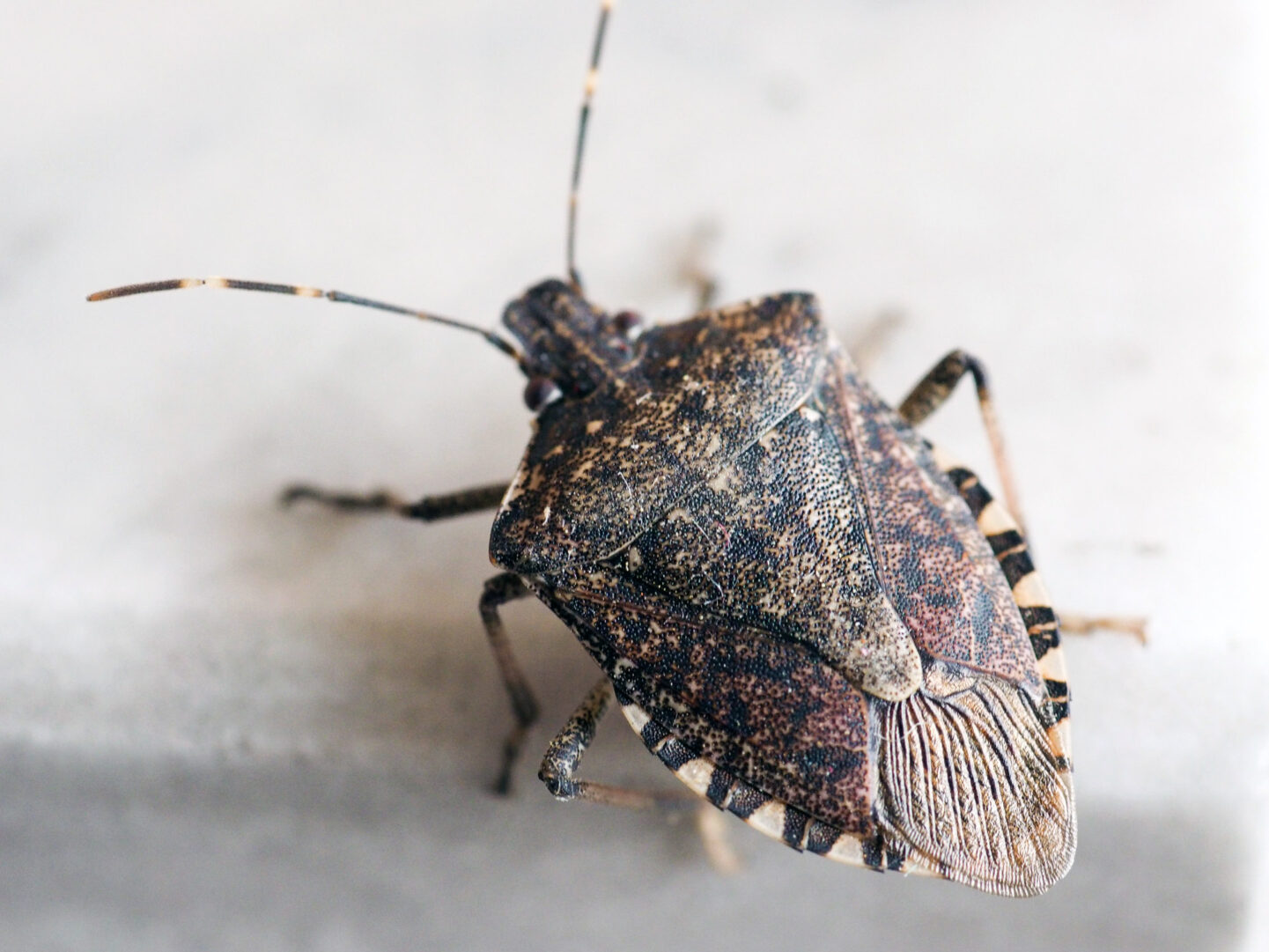
I’ve met countless stink bugs in my line of work. These shield-shaped insects from the Pentatomidae family are notorious for their foul-smelling defense mechanisms. But here’s what I’ve learned: while their odor might make you recoil, stink bugs aren’t dangerous.
In my experience, they’re more of a nuisance to homeowners than a threat. They won’t harm you or damage your home. But don’t just take my word for it – let’s examine why these smelly visitors are harmless, despite their unpleasant reputation.
Where Do Stink Bugs Come From?
Stink bugs, particularly the brown marmorated stink bug (BMSB), have an interesting origin story:
- Native habitat: Most stink bug species are native to various parts of the world. The BMSB, which is the most common invasive species in North America, originally comes from East Asia, including countries like China, Japan, and Korea.
- Introduction to North America: The BMSB was accidentally introduced to the United States in the late 1990s, likely through shipping containers or other imported goods. It was first discovered in Allentown, Pennsylvania in 1996.
- Spread across the continent: Since its introduction, the BMSB has spread rapidly across North America. It’s now found in most U.S. states and several Canadian provinces.
- Local habitats: In their new environments, stink bugs tend to live in orchards, gardens, and wooded areas during warm months. They feed on a variety of plants and crops.
- Seasonal migration: As temperatures cool in fall, stink bugs seek warm places to overwinter, which is when they often enter homes and buildings.
- Lack of natural predators: In North America, the BMSB has few natural predators, which has contributed to its rapid spread.
Understanding where stink bugs come from can help in developing effective strategies for managing these pests, both in agricultural settings and around homes.
Do Stink Bugs Bite?
If you’ve ever seen a stink bug up close, you’ll notice that they have a pretty strange looking mouth. It looks like a straw folded up underneath their body.

While there are insects that use straw-like mouths to suck blood, stink bugs are not among them. They use their mouth to slurp sugary fluids from plants.
In case you’re worried a stink bug might get scared and bite you anyway, you really don’t have to worry about it. Almost all species of stink bug are physically incapable of biting a person even if they tried. Their mouths can only pierce plants, not human skin.
So can stink bugs bite? No, stink bugs can’t bite humans.
Are Stink Bugs Poisonous?
It’s logical to assume that stink bugs are poisonous because their smell is so horrible, but the reality is that they have no venom. Stink bugs have glands in their abdomens or thoraxes that have secretions that are released when they feel threatened, which is why they have such an unpleasant odor. Many stink bug species are even edible (though I don’t necessarily recommend snacking on them).

The only toxicity problem with stink bugs is that some people are sensitive to their odors. But even then, it’s usually more of a mild allergic reaction than anything serious to worry about.
Stink bugs are not dangerous if you or your pet were to eat them!
Can Stink Bugs Damage My Home?
Stink bugs don’t cause any structural damage. However, they can be a bit of a nuisance in the home.
When it starts to get colder and darker, they like to hide in and around homes because they’re a great source of warmth and moisture. A few stink bugs spread around don’t cause a big problem, but if you get many of them, they can be annoying because the smell builds up.
It’s worth treating a large indoor infestation, but otherwise, it’s really up to you whether it bothers you or not. Many people prefer to just scoop them up and toss them outside when they find them, or ignore them altogether.
Can Stink Bugs Damage My Garden?
This is the one way that stink bugs pose a real threat. Both the BMSB and green stink bugs love plants and can destroy many different types of crops. However, Florida has a different species of stink bug that is most common – predatory stink bug nymphs. These stink bugs won’t necessarily damage your garden, but instead, will feed on plant pests.
Common garden plants like tomatoes, peppers, or corn are susceptible to stink bug damage. The unfortunate thing is that it can be hard to tell when they’ve struck.
Unlike other insects that chew and swallow plant material, stink bugs just suck the juice out of everything. So you may open an otherwise healthy ear of corn to find all the kernels shriveled.
Some plants will even stay green long after being attacked by stink bugs, so if you don’t know what you’re looking for, you can be unpleasantly surprised come harvest time. You can use stink bug traps to help control these pests in your garden.
The good news is that they aren’t the most common pest in home gardens. It’s usually big agricultural operations that get huge infestations. A few stink bugs here and there isn’t the end of the world for plants. It’s only an issue when they congregate in huge numbers.
How to Prevent Stink Bugs
While stink bugs aren’t dangerous, they can certainly be a nuisance. Here are some effective ways to prevent these odorous pests from invading your home:
- Seal entry points: Inspect your home’s exterior for cracks, gaps, or holes, especially around windows, doors, and utility lines. Seal these openings with caulk or weatherstripping.
- Use screens: Install or repair screens on windows, doors, and vents to keep stink bugs out while allowing ventilation.
- Reduce outdoor lighting: Stink bugs are attracted to lights. Consider using yellow or sodium vapor lights outside, which are less attractive to insects.
- Keep your yard tidy: Remove piles of leaves, wood, and other debris near your home where stink bugs might congregate.
- Maintain your garden: Regularly inspect your plants for signs of stink bugs and remove any you find promptly.
- Use natural repellents: Plant mint, garlic, or chrysanthemums around your home’s perimeter, as these plants can deter stink bugs.
- Use a vacuum cleaner regularly: If you spot stink bugs indoors, vacuum them up and dispose of the bag immediately to prevent odor spread.
- Consider professional treatment: For persistent problems, consult pest management who can apply targeted treatments around your home’s exterior.
By implementing these preventive measures, you can significantly reduce the likelihood of a stink bug infestation in your home. Remember, it’s easier to prevent an infestation than to deal with one after it occurs.
Frequently Asked Questions
Can stink bugs cause any damage to my home?
No, stink bugs don’t cause structural damage to homes. They’re more of a nuisance than a threat to your home’s structure.
What attracts stink bugs to my home?
Stink bugs are attracted to homes for warmth and moisture, especially as the weather gets colder and darker. They seek shelter in and around homes during these times. Bright lights can also attract them, which is why the prevention tips suggest reducing outdoor lighting or using yellow or sodium vapor lights.
Are stink bugs dangerous to pets?
No, stink bugs are not dangerous to pets. Even if a pet were to eat a stink bug, it wouldn’t be toxic or harmful to them.
What do brown marmorated stink bugs look like?
Brown marmorated stink bugs have a shield-shaped body and are typically brown with a mottled pattern. They have six legs and antennae. The size of adult stink bugs is usually about 5/8 inch long.
What happens if a stink bug gets on you?
If a stink bug gets on you, it’s unlikely to cause any harm. The document states that “Almost all species of stink bug are physically incapable of biting a person even if they tried”. They can’t bite humans, and they’re not poisonous. The main issue would be the potential for them to release their foul-smelling odor if they feel threatened. Some people might have a mild allergic reaction to this odor, but it’s generally not serious.
Final Thoughts

Stink bugs are far from dangerous. They are not completely harmless to have around because of their smell and the damage they can do to plants, but you don’t have to be afraid of them.
Usually, you won’t have to worry about them. If you ever have stink bugs, you should be able to get rid of them quickly, especially with help from a pest control professional.
Article Update Log






Leave a Reply